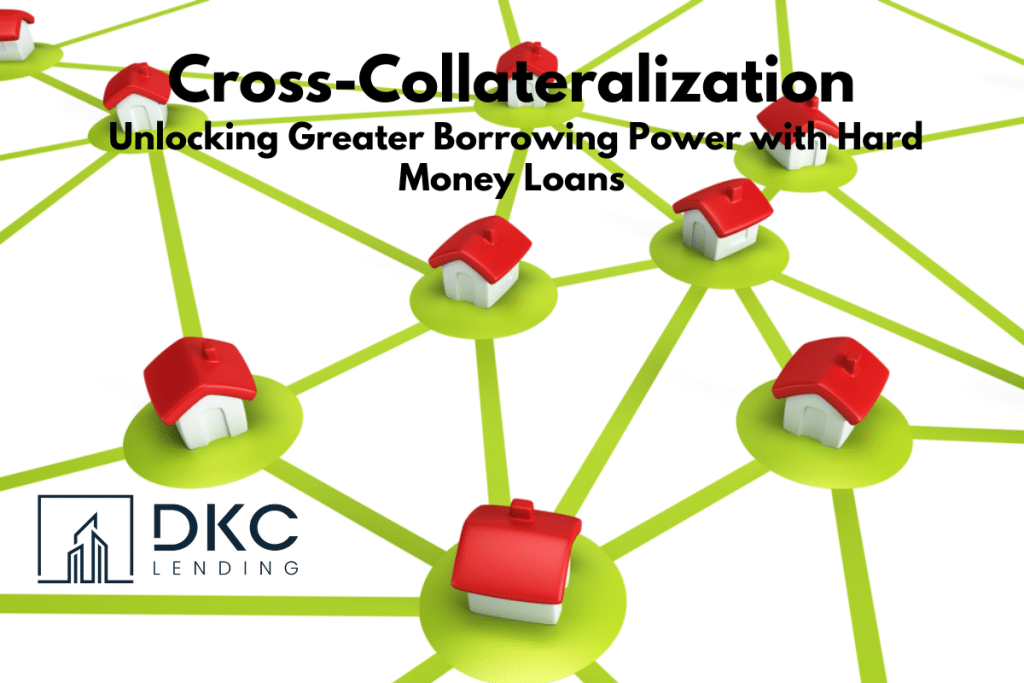Real estate investors often find themselves needing additional financing but lacking the liquid capital to secure a new loan. In such cases, cross-collateralization offers a strategic solution, allowing investors to leverage the equity in existing properties to finance new acquisitions, fund renovations, or refinance debt.
Traditional lenders impose strict lending requirements, making it difficult for investors to access the capital needed for expansion. Hard money lending provides a flexible alternative, enabling investors to use multiple properties as collateral to secure higher loan amounts and accelerate portfolio growth.
Cross-collateralization with hard money loans helps investors maximize borrowing power, optimize cash flow, and unlock new opportunities in residential real estate.
Challenges in Securing Traditional Financing for Expanding Portfolios
Limited borrowing capacity. Conventional lenders often cap loan amounts based on income verification, credit history, and existing debt-to-income ratios, restricting the ability of investors to scale their portfolios.
High equity requirements for new loans. Traditional mortgage lenders require significant down payments or reserves for investment property loans, making it difficult for investors to acquire multiple properties simultaneously.
Slow loan approval process. Conventional financing can take weeks or even months, causing investors to miss out on time-sensitive opportunities while waiting for loan approvals.
Restrictions on property types and conditions. Many banks hesitate to finance distressed or value-added properties, limiting investor access to high-reward investment opportunities.
These limitations push investors to seek alternative financing solutions, with cross-collateralized hard money loans providing a powerful tool to overcome these barriers.
The Hard Money Lending Advantage for Cross-Collateralization
Leveraging existing equity for higher loan amounts. Hard money lenders allow investors to use multiple properties as collateral, increasing their borrowing capacity and enabling them to access more capital without large cash reserves.
Fast and efficient loan approvals. Unlike traditional loans, which require extensive income verification and financial reviews, hard money loans focus on property value, allowing quicker approvals and funding.
Flexible loan structures to match investment goals. Hard money lenders offer adaptable loan terms, including interest-only payments and short-term durations, helping investors manage cash flow and reinvest capital into new projects.
Funding for multiple property acquisitions. Investors can use cross-collateralization to purchase multiple properties simultaneously, reducing the need for individual loan approvals and streamlining the financing process.
Access to financing for distressed or value-add properties. Hard money lenders focus on the potential future value of properties rather than their current condition, making financing renovations, flips, or rental conversions easier.
By cross-collateralization with hard money loans, investors can strategically expand their real estate portfolios without depleting their liquid capital.
Case Study: Scaling a Real Estate Portfolio with Cross-Collateralized Hard Money Loans
Lisa, an experienced investor, owned three rental properties with substantial equity. She identified an opportunity to purchase two additional investment properties in an emerging market but lacked the upfront cash for down payments.
Instead of selling her existing properties or waiting to accumulate more capital, Lisa secured a cross-collateralized hard money loan, using her current rental properties as security for the new loan. This structure allowed her to access a higher loan amount and close on both properties without delay.
With rental demand rising, she quickly leased the new properties and refinanced into long-term financing, freeing up her hard money loan for the next investment. Without cross-collateralization, she would have missed out on a valuable market opportunity.
Strategic Benefits of Cross-Collateralization with Hard Money Loans
Maximizing borrowing power. By using multiple properties as collateral, investors can secure larger loans than they would with a single asset, increasing financial flexibility.
Reducing out-of-pocket capital requirements. Cross-collateralization minimizes the need for large down payments, allowing investors to preserve cash for renovations, marketing, or additional acquisitions.
Enabling faster portfolio expansion. Investors can leverage existing assets to fund new acquisitions, accelerating growth without the delays associated with traditional financing.
Improving cash flow management. Hard money loans with interest-only payments allow investors to maintain liquidity while focusing on property improvements or repositioning strategies.
Creating strategic refinancing opportunities. Investors can use short-term cross-collateralized loans to acquire properties quickly and refinance into permanent financing once property values appreciate.
These benefits position cross-collateralized hard money loans as a valuable tool for investors to scale their portfolios efficiently.
Key Considerations When Using Cross-Collateralization
Understanding loan risks. Because multiple properties are used as collateral, investors must carefully assess their repayment strategy to avoid potential foreclosure on multiple assets.
Evaluating market conditions. Investors should consider market trends, rental demand, and property appreciation potential to ensure their investment strategy aligns with financing terms.
Planning for exit strategies. Investors must develop clear strategies for repaying or refinancing their cross-collateralized loan, whether through property sales, rental income, or transitioning to traditional financing.
Choosing the right lending partner. Working with an experienced hard money lender ensures fair loan terms, transparent underwriting, and flexibility to meet investor needs.
By carefully structuring their financing approach, investors can leverage cross-collateralization effectively while mitigating potential risks.
Best Practices for Success with Cross-Collateralized Hard Money Loans
Select high-equity properties. Investors should leverage properties with significant equity to secure the best loan terms and maximize borrowing potential.
Diversify investment strategies. A balanced portfolio with a mix of rental properties, renovations, and value-add projects helps spread risk and optimize returns.
Monitor market trends. Staying informed about real estate cycles, interest rate fluctuations, and emerging investment areas ensures strategic decision-making.
Work with experienced lenders and advisors. Partnering with knowledgeable professionals helps investors structure loans effectively and optimize portfolio growth.
By following these best practices, investors can make the most of cross-collateralization and use hard money loans as a powerful financing strategy.
Conclusion
Cross-collateralization with hard money loans unlocks significant opportunities for real estate investors, providing higher borrowing power, faster financing, and increased portfolio flexibility. Traditional lending options often fail to support the rapid growth and strategic acquisitions investors seek, making hard money lending an ideal alternative.
By leveraging existing equity, investors can secure funding for multiple acquisitions, streamline the financing process, and maximize their investment potential. For investors looking to expand their portfolios efficiently, DKC Lending provides expert guidance, competitive loan structures, and the fast funding needed to turn investment opportunities into long-term success. With the right financing partner, investors can accelerate their growth, optimize capital allocation, and achieve greater financial returns in residential real estate.


